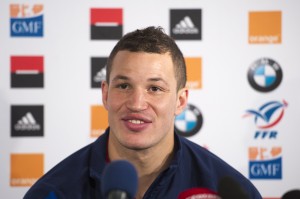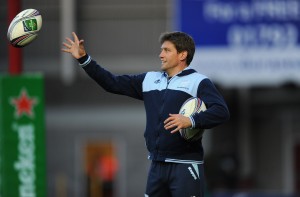
Bridesmaids again: France are forced to look on as New Zealand celebrate another victory in the background
By Gavin Mortimer
There were times on Saturday night when France made the All Blacks look ordinary. But ten years from now the record books and the rugby websites won’t mention that fact. They’ll just note the score – France 19 New Zealand 26 – extending the All Blacks’ winning run to 12 matches this year and deepening the malaise afflicting France who have now just one victory in their last nine internationals.
France’s defeat in Paris on Saturday was only the second time in 13 years that Les Bleus have lost their opening fixture of the autumn programme; the last occasion was 2006 when Bernard Laporte saw his side spanked 47-3 in Lyon by the All Blacks. Instead the French have developed a habit in recent years of starting their Test season in storming style, only to peter during the rest of November. Remember 2009 when they beat South Africa – then the world champions – 20-13 in Toulouse, only to succumb 39-12 to New Zealand a fortnight later? And 12 months ago France ravaged Australia 33-6 before slipping into rank mediocrity against Argentina and Samoa.
So perhaps there’s hope for the two Tests to come, against Tonga on Saturday and then the clash with South Africa the following weekend. Coach Philippe Saint-Andre certainly believes his side is going in the right direction, though he would, wouldn’t he, as the pressure mounts on the former Gloucester and Sale director of rugby. Asked by the French press on Sunday if he still has faith in his players, Saint-Andre replied: “Yes, and three times yes!” He continued: “We’re missing the positive result but, I repeat, in watching and re-watching our performance on Saturday night, I am absolutely convinced that we will reap the benefits in the near future.”
For Saint-Andre the difference between the two sides on Saturday night was France’s tendency to commit too many small errors under pressure. “We’re still missing a collective experience that will allow us to play at the same intensity as the All Blacks,” explained Saint-Andre, adding that he believes they are on “the right path” and that “if we continue like that we will really be contenders for the World Cup.”
Saint-Andre singled out Wenceslas Lauret for particular praise, the coach as impressed as most with the performance of the French flanker, and he also mentioned the composure of youngsters Gael Fickou (centre) and Rabah Slimani (prop) when they appeared as second-half substitutes. In addition Wesley Fofana and Florian Flitz formed an encouraging centre partnership, while Remi Tales was an aggressive and creative presence at fly-half, consistently asking questions of the New Zealand gain line defence.
Nonetheless Tales – and this is a complaint often levelled at French fly-halves – let himself down with the basics. His kicking from hand was inadequate, too often his restarts too long or his touch-finders too short. The reason Jonny Wilkinson has acquired legendary status in France is because of his work ethic. For example, Wilkinson throughout his career has spent thousands of hours on the training ground perfecting his restarts, a diligence one now sees in Dan Carter and Jonathan Sexton.
French fly-halves, in general, disdain such monotonous attention to detail and prefer to train with the ball in hand. It was a point touched on recently by Yannick Bru, Saint-Andre’s assistant in the national set-up, who complained: “Look at the All Blacks’ restarts. The balls always fall in the exact spot where they want them to…it’s never true for us. No fly-half in France is capable of landing the ball on such and such a point.”
Tales is a talent, however, and Saint-Andre should stick with him for the foreseeable future. But what he should also do, tout de suite, is get on the phone to Ronan O’Gara, now Racing Metro’s kicking coach, and hire him to turn Tales into a more complete number ten.








